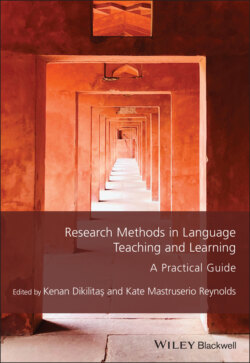Читать книгу Research Methods in Language Teaching and Learning - Группа авторов - Страница 16
Overview
ОглавлениеI first became interested in “self-efficacy beliefs,” which is “people’s judgements of their capabilities to organize and execute courses of action required to attain designated types of performances” (Bandura, 1986, p. 391), in 1998. This was while studying for an MA TESOL through the University of Edinburgh and working for the British Council in Nepal; although I was involved in some language teacher education at the time, running workshops for the Nepal English Language Teachers’ Association and the Dalai Llama’s Snowland Foundation, my primary role included teaching 10-week 50-hour general English courses at the language center. What attracted me to self-efficacy beliefs as an area of research is that these beliefs, which play an important role in mediating action, are task-, domain-, and context-specific, and are consequently relatively fluid and open to change with carefully attuned support (Pintrich & Schunk, 1996). As a teacher, I was interested in how learner training, including in strategy use, could build self-efficacy beliefs in ways of learning more independently, and focused my action research dissertation (Wyatt, 2000) on this topic. So I elicited self-efficacy beliefs in different aspects of language learning, and then designed a series of learner training components to embed in the first month of my general English courses, in areas such as vocabulary building, utilizing the phonemic chart, mind-mapping essay plans, predictive listening, skimming and scanning reading strategies, and utilizing the CD-ROMs (this was 1999) in the self-access center. Self-efficacy beliefs were subsequently re-elicited directly and indirectly, so that I could make some assessment as to whether the learner training had had any impact.
By 2002, when I was working on a University of Leeds BA TESOL project in Oman, I had already spent 2 years in the country as a regional teacher trainer/advisor, and as I contemplated commencing doctoral research, I realized that I wanted to continue researching self-efficacy beliefs. My earlier research had reinforced my reading of the literature as to the pivotal role of these beliefs in shaping activity choice and the quality and quantity of effort spent on task (Bandura, 1986). However, since I was now employed as a teacher educator, I wished to conduct the research with language teachers, rather than with language learners.
The BA TESOL project ran from 1999 until 2008, with six overlapping cohorts around the country; it helped nearly 1,000 Omani teachers of English to upgrade their knowledge, skills, and qualifications, with a view to enabling them to contribute more effectively to curriculum renewal (Atkins et al., 2009; Wyatt, 2008). During their 3-year course, in-service English language teachers in government schools studied part-time, teaching 4 days per week during the school term and attending a regional training center on the other day. There were also intensive study blocks during summer and winter, when modules would be taught by University of Leeds lecturers and regional tutors based in Oman. I was one of the latter; during Cohort 4 (the cohort with which I did the research), I worked with 35 teachers (subdivided into two groups), lecturing (2 days per week), providing tutorial support, and visiting schools (in towns, coastal villages, and mountainous areas). I would visit every teacher once per semester to observe and provide feedback on teaching practice that was not assessed.
So, this was a rather different situation from that which I had conducted my master’s-level research, which had employed a mixed methods research design with survey data gathered over 10 weeks in relation to small-scale classroom innovation (Wyatt, 2000). Working for the British Council in Nepal, this had seemed the most practical thing to do. Now in Oman, working with 35 teachers on a 3-year teacher education project, I wanted to exploit the opportunities provided by the context. I outlined at the start of my PhD proposal, submitted in January 2003, that I was interested in investigating the effects of the 3-year BA TESOL program on the self-efficacy beliefs of participating English teachers, and how changes in these beliefs related to their classroom teaching practices.
Features of the proposed research methodology included continuous data collection until the end of the 3-year program with regular semi-structured interviews that would take place in the context of post-observation discussions conceptualized as the primary data collection tool. I envisaged the research methodology as essentially longitudinal, characterized by a repeated cross-sectional design tracking the same population (Dörnyei, 2001) of about 10 teachers, selected from volunteers to achieve balance and variety. Completely absent from my research proposal were the following terms, which subsequently became central to the research: “case study,” “qualitative,” “cognition,” “practical knowledge.” Looking back, there was much to learn. My proposal was nevertheless accepted, and I was assigned Simon Borg and Gary Chambers (experts in teacher cognition and teacher motivation, respectively) as supervisors.
